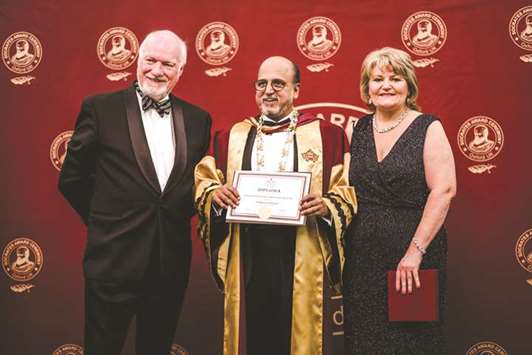Doha Bank’s chief executive officer was honoured with the title ‘Honorary Professor of the Academic Union, Oxford, UK’ during the recently held London Summit of Leaders ‘Achievements Forum 2018’ by the Europe Business Assembly.
Dr R Seetharaman received the award in the presence of key British and world experts, members of the Oxford Speakers Bureau, Academic Union professors, corporate leaders, investors, and like-minded professionals.
During the event, Dr Seetharaman spoke on global carbon emissions. Citing a recent IEA survey of global carbon levels, he said global carbon dioxide emissions surged to record levels in 2017 after the landmark 2016 Paris climate agreement was signed.
“Asia accounted for two-thirds of the increase in global carbon emissions. Carbon dioxide emissions also climbed in the EU by 1.5% in 2017, mainly due to strong demand for oil and gas. US carbon emissions in 2017 reported a decrease of 0.5% from 2017, while China’s economy emissions increased by 1.7%.
“Green banking promotes environmental-friendly practices and reducing carbon footprint from the banking activities. The carbon footprint will be different across various geographies and economic sectors, and hence country-wise and sector-wise allocations should be explored. Green banking is the solution for sustainable development.”
Seetharaman said green banking, green bonds, carbon finance, global environmental facility, clean technology fund, feed in tariff, and public private partnership (PPP) models are some of the ways for financing.
He said a green bank finances the deployment of renewable energy, energy efficiency, and other clean infrastructure projects. Green bonds are bonds just like any other that raise capital but for green projects. Carbon finance provides a means of leveraging new private and public investment into projects that reduce greenhouse gas emissions.
Seetharaman said global environmental facility requires that co-finance from other public agencies is provided for global environmental facility projects as it expands the resources available to finance environmental objectives.
Clean technology fund concessional financing focuses on large-scale, country-initiated projects in power sector, transport sector, and energy efficiency. Feed-in tariffs are payments to ordinary energy users for the renewable energy they generate. PPPs are also emerging as a successful business model within the clean technology to create scale and mobilise necessary funding, according to Seetharaman.
On green banking initiatives by Doha Bank, Dr Seetharaman said the bank has promoted paperless banking, Internet banking, SMS banking, phone banking, and ATM banking, as well as online channels such as Doha Souq, e-Remittances, and online bill payments.
Doha Bank has launched ‘Green credit card’ and green account and also has a dedicated green banking website, which integrates the bank’s initiatives in promoting environmental safety with the community by reaching out to both the public and private sectors.
He said Doha Bank conducted ‘Green Quiz’ with global warming and climatic changes as a central theme to spread awareness in various countries across the globe.
Doha Bank was involved in project financing for supporting the construction of Qatar General Electricity & Water Corporation’s Water Security Mega Reservoirs Project. It has also provided term loan for Emirates Central Cooling Systems, which provides Efficient District Cooling Services to developments in Dubai and the surrounding region.
Seetharaman said Doha Bank has tracked developments pertaining to various Conference of Parties meetings of United Nations Framework Convention on Climate Change.

Doha Bank CEO Dr R Seetharaman receives the title during the London Summit of Leaders ‘Achievements Forum 2018’.
